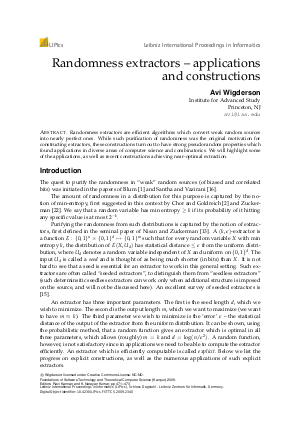Randomness extractors -- applications and constructions
Author Avi Wigderson
-
Part of:
Volume:
IARCS Annual Conference on Foundations of Software Technology and Theoretical Computer Science (FSTTCS 2009)
Part of: Series: Leibniz International Proceedings in Informatics (LIPIcs)
Part of: Conference: IARCS Annual Conference on Foundations of Software Technology and Theoretical Computer Science (FSTTCS) - License:
 Creative Commons Attribution-NonCommercial-NoDerivs 3.0 Unported license
Creative Commons Attribution-NonCommercial-NoDerivs 3.0 Unported license
- Publication Date: 2009-12-14
File

PDF
LIPIcs.FSTTCS.2009.2340.pdf
- Filesize: 118 kB
- 3 pages
Document Identifiers
Subject Classification
Keywords
- Randomness extractors
- weak random sources
- purification of randomness
Metrics
- Access Statistics
-
Total Accesses (updated on a weekly basis)
0PDF Downloads0Metadata Views
Abstract
Randomness extractors are efficient algorithms which convert weak random sources into nearly perfect ones. While such purification of randomness was the original motivation for constructing extractors, these constructions turn out to have strong pseudorandom properties which found applications in diverse areas of computer science and combinatorics. We will highlight some of the applications, as well as recent constructions achieving near-optimal extraction.
Cite As Get BibTex
Avi Wigderson. Randomness extractors -- applications and constructions. In IARCS Annual Conference on Foundations of Software Technology and Theoretical Computer Science. Leibniz International Proceedings in Informatics (LIPIcs), Volume 4, pp. 471-473, Schloss Dagstuhl – Leibniz-Zentrum für Informatik (2009)
https://doi.org/10.4230/LIPIcs.FSTTCS.2009.2340
BibTex
@InProceedings{wigderson:LIPIcs.FSTTCS.2009.2340,
author = {Wigderson, Avi},
title = {{Randomness extractors -- applications and constructions}},
booktitle = {IARCS Annual Conference on Foundations of Software Technology and Theoretical Computer Science},
pages = {471--473},
series = {Leibniz International Proceedings in Informatics (LIPIcs)},
ISBN = {978-3-939897-13-2},
ISSN = {1868-8969},
year = {2009},
volume = {4},
editor = {Kannan, Ravi and Narayan Kumar, K.},
publisher = {Schloss Dagstuhl -- Leibniz-Zentrum f{\"u}r Informatik},
address = {Dagstuhl, Germany},
URL = {https://drops.dagstuhl.de/entities/document/10.4230/LIPIcs.FSTTCS.2009.2340},
URN = {urn:nbn:de:0030-drops-23407},
doi = {10.4230/LIPIcs.FSTTCS.2009.2340},
annote = {Keywords: Randomness extractors, weak random sources, purification of randomness}
}
